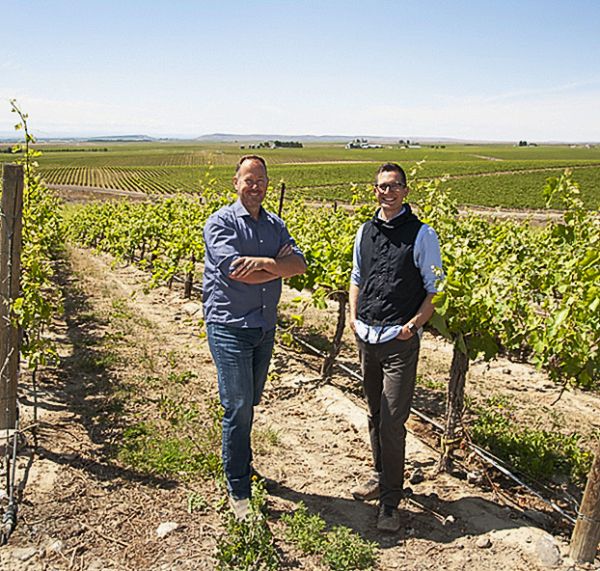
Ray McKee (left) and Jeff Andrews, Trothe. Copyright Richard Duval.
“What I want to do is create a wine that can sit at the table with a world class wine from anywhere in the world and show that the Horse Heaven Hills belongs there,” says Jeff Andrews, founder of Trothe and managing partner at Andrews Family Vineyards.
It’s taken decades to arrive at that moment. The Andrews family has been farming in the Horse Heaven Hills for four generations. Andrews’ great grandparents, George and Mabel Smith, are said to have turned an astonishing 100,000 acres of sagebrush into farmland in the Horse Heavens. Now the family is aiming to put the appellation on the world wine map.
A desire to connect with nature
Jeff Andrews started his career on a very different path than grape growing. He received a degree in criminal justice and political science from Washington State University. Andrews subsequently joined the Marine Corps Reserve, but he was injured during training and received a medical discharge. Andrews attended Seattle University School of Law but ultimately couldn’t see himself practicing.
“Sitting in an office, typing out legal briefs day in and day out, that was kind of mind numbing for me,” says Andrews. “I really wanted to connect with nature.”
That connection would come. His father, Mike Andrews, began planting wine grapes in 1994 at Coyote Canyon Vineyard in the Horse Heavens. He was following in the footsteps of his brother, Rob, who established McKinley Springs Vineyard with his father in 1980. After Andrews graduated from law school and passed the bar exam in 2006, he joined the family business.
At the time, his father focused on a wide variety of crops. Over time, they transitioned exclusively to wine grapes. The family’s vineyard has historically sold most of its fruit. In the back of his mind, however, Andrews was thinking about starting a high-end wine project.
Cabernet Sauvignon as the gold standard
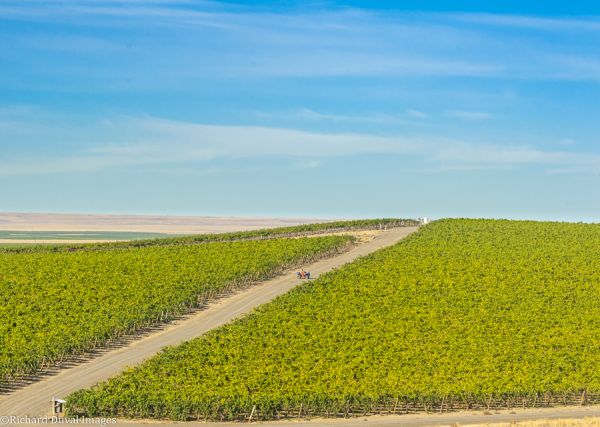
Andrews Family Vineyards copyright Richard Duval.
“I always knew I wanted to do something that would elevate our site and the Horse Heaven Hills,” Andrews says. “But it takes a long time to develop the industry experience you need to even attempt something like this.”
While the idea took time to germinate, the variety such a project would focus on was immediately clear. It would be Cabernet Sauvignon.
“Cabernet, for me personally, It’s the gold standard of wine grapes,” Andrews says. “It does this amazing job of capturing the essence of the site, and you can tell the story of a vintage with it.”
Andrews already knew Cabernet from his family’s vineyard was special. Grapes from the site were the backbone of the Columbia Crest 2005 Reserve Cabernet Sauvignon. Wine Spectator named that wine its Wine of the Year in 2009. It was then, and remains today, the only Washington wine to receive the honor.
Ste. Michelle Wine Estates contracted many of the best blocks at Andrews. When some of those blocks became available in 2018, the idea for a winery took flight.
Making wine in the vineyard
Andrews had one name in mind for a winemaker: Raymon McKee.
McKee is a second generation winemaker who brings over three decades of experience making wine in Washington. He’s worked at Heaven’s Cave, Covey Run, and Columbia. McKee spent 10 years at Chateau Ste. Michelle, eight as head red winemaker at the company’s Horse Heavens Hills facility.
“I said yes even before I said yes,” McKee says of his response when he was approached by Andrews. “He said, ‘I want to make the best Cabernet possible, and you can have any grapes or any tools you need.’ I don’t know who would say no to that as a winemaker.”
The reason Andrews immediately thought of McKee was simple. He had watched how much time he spent in the family’s vineyard.
“I have been blessed to have a lot of amazing mentors – David Lake, Kerry Norton, Bob Berthau – and every single one of them spent all their time in the vineyard,” McKee says. “That’s how I learned how to make wine, in the vineyard.”
McKee’s familiarity with the Andrews’ site gave him a clear sense of direction for the wine. “I knew immediately which blocks I would go pick from to make the wine,” McKee says.
Behind the label
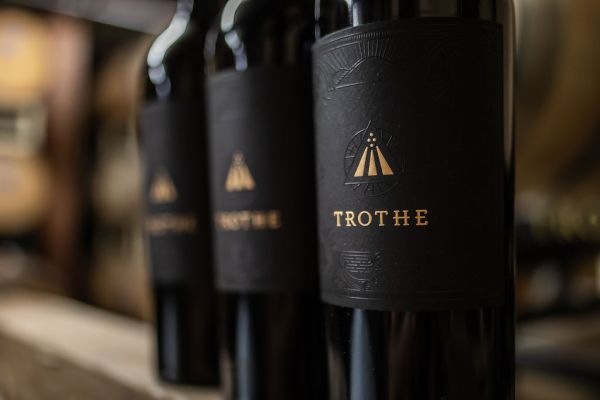
Photo by Cameron Karsten Photography.
Trothe is Middle English for loyalty, faithfulness, and fidelity. “We felt it was a word that summed up everything we aim to accomplish in the way we tend our land, our vineyards, and in the way we craft our wines,” Andrews says.
The Trothe label tells the family story. The three bars on the logo represent knowledge, nature, and truth. The four dots above that symbolize the four generations of the family that have farmed in the Horse Heavens.
Other images on the label continue the story: wheat, cattle, water, sunshine, grapes leaves, and hills. The label also has three crosses, with Mike Andrews erecting three, 50-foot crosses at the highest point in the vineyard approximately 20 years ago.
In addition to its flagship Cabernet Sauvignon, Trothe makes a Syrah and other limited wines. The latter are made depending on what excels that vintage.
In 2023, Andrews also launched a label called Sagebreaker, with the name a nod to the family’s ancestors. Whereas Trothe focuses on varietal wines, Sagebreaker is dedicated to blends. All of the wines at both wineries are produced in extremely small quantities.
Trothe built a 7,500-square foot production facility in 2022. The family is adding square footage that will increase the space to approximately 9,000 square feet. It includes room for luxury custom crush.
Trothe Cabernet Sauvignon
The foundation for the Trothe Cabernet Sauvignon, first made in 2018, is Block 98 Cabernet Sauvignon. This is the same block that was the backbone of the Columbia Crest 2005 Reserve. The block is situated between 1,000 and 1,100 feet above sea level. McKee believes the silty soils at the vineyard are part of the what makes the site and appellation so special.
“The Horse Heaven Hills gives that elegance you get (from silty soils), yet at the same time, with the heat we get here, we’re making powerful, well-structured, full-bodied wines that express themselves in an elegant way,” he says.
The Trothe Cabernet surely has both elegance and power. Perhaps most impressively, though, the wine does not go straight for the knockout punch, as is common with wines of this pedigree and price. The alcohol seems measured, the use of new oak, typically around 75%, judicious.
“It’s very easy to impress a consumer with a lot of yummy but impactful oak,” says McKee. “When you get in these older blocks like we have here, they shine through so well that they don’t need the frosting of a lot of barrel to fill in cracks.”
The results thus far have been spectacular. In just a few vintages, Trothe has established itself as one of the finest expressions of Cabernet Sauvignon in Washington. The wine seems sure to accomplish Andrews’ broader goal of further elevating the Horse Heaven Hills.
“We’re committed to showing that this is an appellation that can compete with the best of the world,” Andrews says.
* * *
See Trothe wine reviews in the review database. See recent Sagebreaker reviews.
Read a recent article about Horse Heaven Hills Cabernet Sauvignon. Read a feature article I wrote for Wine Enthusiast on the Horse Heaven Hills.
Northwest Wine Report is wholly subscriber funded. Please subscribe to support continued independent content and reviews on this site. It is the only way that the site will be able to continue.
To receive articles via email, click here.


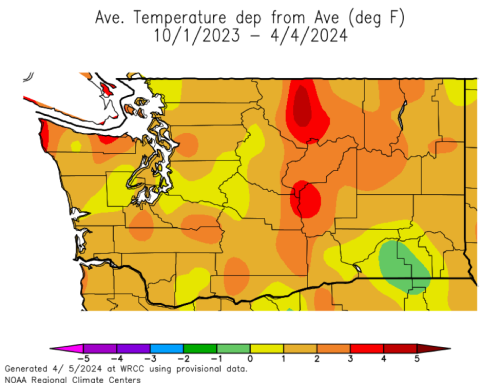
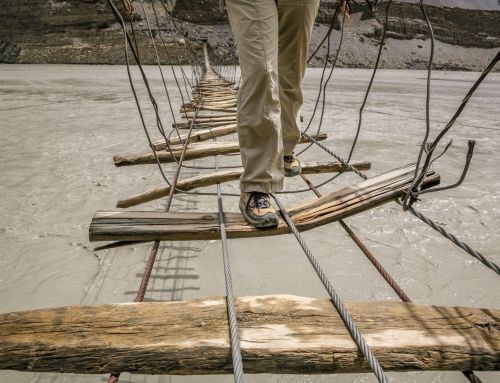

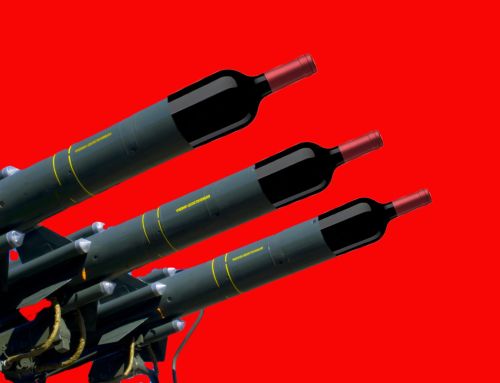

Leave A Comment